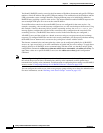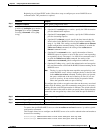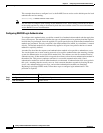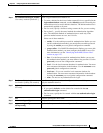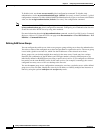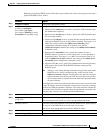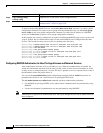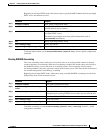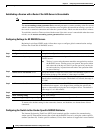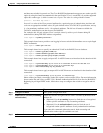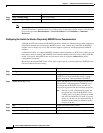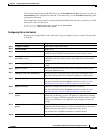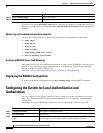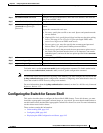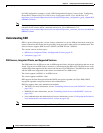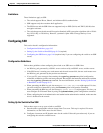
9-36
Catalyst 2960 and 2960-S Switch Software Configuration Guide
OL-8603-09
Chapter 9 Configuring Switch-Based Authentication
Controlling Switch Access with RADIUS
Establishing a Session with a Router if the AAA Server is Unreachable
Note To configure this command, the switch must be running the LAN Base image.
The aaa accounting system guarantee-first command guarantees system accounting as the first record,
which is the default condition. In some situations, users might be prevented from starting a session on
the console or terminal connection until after the system reloads, which can take more than 3 minutes.
To establish a console or Telnet session with the router if the AAA server is unreachable when the router
reloads, use the no aaa accounting system guarantee-first command.
Configuring Settings for All RADIUS Servers
Beginning in privileged EXEC mode, follow these steps to configure global communication settings
between the switch and all RADIUS servers:
To return to the default setting for the retransmit, timeout, and deadtime, use the no forms of these
commands.
Configuring the Switch to Use Vendor-Specific RADIUS Attributes
The Internet Engineering Task Force (IETF) draft standard specifies a method for communicating
vendor-specific information between the switch and the RADIUS server by using the vendor-specific
attribute (attribute 26). Vendor-specific attributes (VSAs) allow vendors to support their own extended
Command Purpose
Step 1
configure terminal Enter global configuration mode.
Step 2
radius-server key string Specify the shared secret text string used between the switch and all
RADIUS servers.
Note The key is a text string that must match the encryption key used on
the RADIUS server. Leading spaces are ignored, but spaces within
and at the end of the key are used. If you use spaces in your key, do
not enclose the key in quotation marks unless the quotation marks
are part of the key.
Step 3
radius-server retransmit retries Specify the number of times the switch sends each RADIUS request to the
server before giving up. The default is 3; the range 1 to 1000.
Step 4
radius-server timeout seconds Specify the number of seconds a switch waits for a reply to a RADIUS
request before resending the request. The default is 5 seconds; the range is
1 to 1000.
Step 5
radius-server deadtime minutes Specify the number of minutes a RADIUS server, which is not responding
to authentication requests, to be skipped, thus avoiding the wait for the
request to timeout before trying the next configured server. The default is
0; the range is 1 to 1440 minutes.
Step 6
end Return to privileged EXEC mode.
Step 7
show running-config Verify your settings.
Step 8
copy running-config startup-config (Optional) Save your entries in the configuration file.



